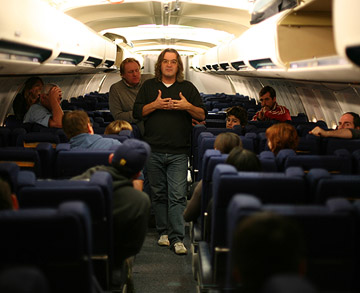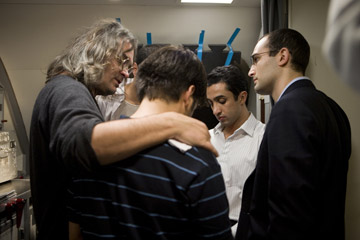Copyright ©2007 PopEntertainment.com. All rights reserved.
Posted:
February 17, 2007.
If you
have seen director Paul Greengrass's earlier docu-fiction feature, Bloody
Sunday – which captures that fateful day in Derry, Northern Ireland,
when thirteen unarmed protestors were gunned down by British troops sparking
"The Troubles" there – you would know that he can handle this assignment.
So despite all the trepidation about making a film about 9/11, the producers
did the right thing putting of this most controversial film in the hands of
a man who knows the fine balanace between drama and sensationalism. Loaded
up with generally unknown actors to add to the authenticity, military air
traffic controllers, real FAA air traffic controllers and actual United
flight crews were used in some scenes. The film was shot with basic portable
cameras rather than expensive pro version for the immediacy. Families of the
40 passengers and crew members killed on Flight 93 cooperated in the
production, offering Greengrass detailed background about their loved ones.
The actors who played the terrorist hijackers and the passengers and crew on
the flight were kept separated so that the director could capture the fear
and hostility; once they had the background of their characters in mind they
improvised a good part of their scenes.
So it was most fitting that this first serious feature film would open the
2006 Tribeca Film Festival – five years after 9/11. The filmmakers donated a
percentage of the opening weekend proceeds to the Flight 93 memorial near
Shanksville, Pennsylvania. Even though Oliver Stone's
World
Trade Center
was the higher-profile film with more established actors, United 93
garnered Greengrass and the film a Best Directing and Best Editing Oscar nom
this year.
How did you feel making the first major studio project about that day?
The stakes were high. It's an important subject. It affects many people's
lives. There's a responsibility to be mature and not cause offense but to
tell the truth as you see it. We made some decisions on what kind of a film
would stand the best chance for fulfilling that criteria. This was a small
film. It wasn't a big blockbuster filled with movie stars. You have to look
at the stakes before you start and you have to be clear about what you want
to do, what you want to say.
What did
you want to say then?
Well, that it seems to me that in my country and yours, we're not agreeing
about what's happened since 9/11. But I wanted to reach back to the common
ground, and the common ground is whatever it is that happened that morning.
I think we all agree with that so let’s go back and look at it. Let's try
and examine in detail, and see what it can tell us about what happened and
where we've come from. And I think, I hope, that it does that. There will be
many other films to be made about this subject, believe me, but I thought
that that was a responsible and a reasonable place to start.
 There are the recent cockpit flight recordings that were released, okay,
but how did you gather all the information this film was based on?
There are the recent cockpit flight recordings that were released, okay,
but how did you gather all the information this film was based on?
We subsequently got some tapes from N.E.A.D.S, the military recordings and
we were pretty close, you know? When I made this film, bear in mind, I spent
a good deal of my career making films about these kinds of subjects. A lot
in Northern Ireland, but not just Northern Ireland, but in the Middle East
and elsewhere, not everything I've ever made has been on the subject of
terrorism, but I've returned to it numerous times and I suppose over the
years that there is a place for films that tell you what happened.
Now, you have to gather your material as comprehensively and as reasonably
as you can within a period of time that you've got to make the film. You
need, from my view, to gather together people who can help you; who are
willing to recreate that from a position of expertise. You can't just do it
with actors, although actors are
important.
You need to get the cross fertilization between actor and professional
people, so that you gather together in a place for a couple of months, and
together you say let's try to explore a believable truth based on what we
can know. You gather together a group of actors, the families, real pilots,
real stewardesses, real military, from that day real air traffic
controllers, various people; and you have a conversation. You don't all
agree with each other – on the contrary, you try and synthesize this thing.
Would you really have picked up a trolley and run it from the back of the
plane? The mythology is, I believe, that the passengers ran the trolley from
the back of the plane. Well, when you sit in a real airplane with real
stewardesses, they will tell you that that could not have happened because
they have a hard enough time walking the trolley up and down the aisle;
secondly you're sitting there, 40 feet or less from a person with a bomb...
would you really advance on a person from behind a trolley? Or would you
choose your biggest fastest person and run because speed would be of the
essence. Forgive thoughts of judgment on an attempt to time to create
something that feels truthful.
Is it more of a dramatic recreation?
No. You take all the available facts as you can know them at that moment in
time and you synthesize those first and then you work those out in
conjunction with the expertise that as a group you have and you come up with
something that is a believable truth. You start with the 9/11 commissions
and all the declassifications of the 9/11 commissions including a 120 page
document about flight 93. You start with a whole mass of information which
you make sense of in a written document before you ever begin and that's
what you work with.
What were your thoughts about the "too soon" debate?
In the too soon debate, you don't know until people see it. The families
have seen it and the families have been incredibly supportive.
How important was it for the actors playing the American passengers to
meet with the families? Did you encourage that?
Before filming, it was up to the families. Did they want to be contacted or
would they rather not. And most of them pretty much wanted to be. Most of
the actors did one way or another. Subsequently to that, I don't think any
of them met at that point, but I think some of them had. It was an amazing
couple of days when they watched that film.
 No one knows what happened prior to boarding the plane. In the film; you
show one of the terrorists making a phone call and saying "I Love you." Why
did you decide to humanize them?
No one knows what happened prior to boarding the plane. In the film; you
show one of the terrorists making a phone call and saying "I Love you." Why
did you decide to humanize them?
I don't think that you can watch this film and not think that the film
judges them for their most appalling acts. The question is, does it make it
easier for us if we think that they are not human? Because I think it does
and I think that we need to confront the fact that this danger remains.
There are a lot of young men who flock to that banner. Who are hijacking
Islam and perverting it.
And the one thing that we can know about this day without a shadow of a
doubt is that there was nothing exceptional about those young men either.
Nobody noticed them. Nobody sitting next to them said, “You’re not human.”
They looked like us. They looked unexceptional and with respect to the
particular scene of “I love you,” well, number one, that's what he did. And
number two, I wanted the film to be framed to by two “I love you” calls.
Burnett, Jr. sits down next to him and makes a phone call. Burnett, Jr.
makes a hum drum business call, completely unaware of anything abnormal. And
the man sitting next to him says “I love you” because he's about to go off
and commit mass murder. An hour and 40 minutes later, Burnett, Jr. picks up
the phone, calls his wife and says “I love you.” I wanted it to be symmetry.
How meaningful was it to be opening at the Tribeca Film Festival?
Incredibly important. Honored because it's New York, and anxious because
it's New York. And humbled because it's New York. I was literally a boy, I
was 18, when I first came to this city. I spent most of that year here.
Without any exaggeration I became a man in this city.
Email
us Let us know what you
think.
Features
Return to the features page.
